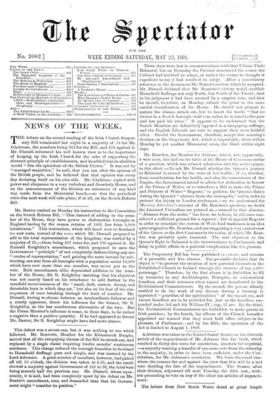Mr. Baxter carried on Monday his instruction to the Committee
on the Scotch Reform Bill, "That instead of adding to the num- ber of the House, they have power to disfranchise boroughs in England having by the census returns of 1861 less than 5,000 inhabitants." This instruction, which will hand over to Scotland ten new seats, instead of the seven which Mr. Disraeli proposed to add to the total representation of the kingdom, was carried by a majority of 21,‚ÄĒthere being 217 votes for, and 196 against it. Sir Rainald Knightley's amendment, which proposed to save the Government "principle" of not completely disfranchising any one " centre of representation," and gaining the seats instead by sub- tracting one seat from all boroughs with a population under 12,000 which have now more than one member, was never put to the vote. Both amendments alike deprecated addition to the num- ber of the House, Sir R. Knightley asserting that his objection was not merely based on his reluctance to add further to the manifold inconveniences of the " small, dark, narrow, dreary, and detestable barn in which they sat," but also on his fear of the con- sequences of once breaking through the limit of number. Mr. Disraeli, having to choose between an insubordinate follower and a sturdy opponent, threw his influence for the former, Sir It. Knightley, as the less mischievous alternative of the two. But the Prime Minister's influence is come, in these days, to be rather a negative than a positive quantity. If he had appeared to favour Mr. Baxter, Sir R. Knightley might have had more chance.


































